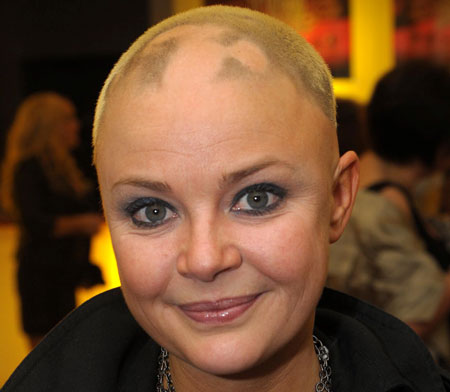03.03.2010
in HAIR LOSS FACTS

Before you try it, getting a cow to lick your scalp or standing upside down, neither will help your hair to grow back.
For every treatment that works there are a dozen that don’t. But some age-old myths are still in circulation. We sort fact from fiction in 20 of the most common hair loss myths.
Hair loss comes from the mother’s side
Baldness is hereditary, but it’s not limited to the maternal side of the family. The hair loss gene can come from either parent.
Frequent ejaculation causes baldness
There’s no proven link between frequent ejaculation and hair loss. There’s also no truth to the myth that the more sex you have the less hair you’ll lose.
Washing your head in cold water cures baldness
Washing your head every morning in cold water may boost blood circulation but it does nothing for baldness.
Losing hair every day means you’re balding
If you’ve got male-pattern baldness then, yes, you’ll lose hair every day. That said, it’s normal to lose as many as 100 hairs a day. These will usually grow back.
It’s unusual to lose hair from our early 30s
As you get older, the number of hair follicles on your scalp will progressively go down. With ageing, hair becomes finer and more sparse.
Hair products can cause hair loss
Hair care products don’t cause hair loss. You can mix as much gel, mousse or spray in to your hair as you like.
Standing on your head cures hair loss
Standing on your head to increase blood flow won’t regenerate your scalp. Blood circulation has no influence on hair loss.
Constantly wearing hats causes baldness
Unless your hat is so tight that it puts excessive tension on the hair, it doesn’t matter if you wear a cap 24 hours a day, seven days a week. Hats do not lead to hair loss.
Brushing or massaging the scalp can reduce hair loss
Blood circulation doesn’t boost hair growth. However, too much brushing may cause injury, leading to loss of hair.
Hairstyles don’t cause hair loss
Styles that put too much tension on hair, such as tight plaits, ponytails, corn-rows or winding too tightly on to rollers (especially heated rollers), can cause some hair loss.
Cutting your hair will make it grow back thicker
Hair feels thicker after a hair cut because hair is thicker at the base. Cutting your hair will not help to prevent male or female-pattern baldness.
Blow drying doesn’t cause hair loss
Blow drying can damage, burn or dry the hair, which can cause it to fall out. But this hair will grow back immediately. It is not considered to be permanent hair loss.
Wigs and toupees make hair loss worse
Hair doesn’t need to breathe. Only the roots are alive, and they get their oxygen from the blood in the scalp. Wigs and hairpieces only damage hair if they are too tight.
Excessive washing of hair causes hair loss
Shampoo only removes hair that has already fallen out.
Long exposure to the sun leads to hair loss
Hair loss occurs at the follicle level. Fortunately, your hair acts as a shield against the sun to protect the roots.
Hair dyes cause balding
Most hair-colouring treatments contain chemicals that, if not properly used, are harmful to hair. However, such dyes don’t cause hair loss.
Diet can cause hair loss
A balanced diet is essential for your general health. However, there’s no evidence that certain types of food boost hair growth or cause hair loss.
Stress causes hair loss
Stressful episodes, such as an accident or surgery, can cause hair production to shut down temporarily. Stress doesn’t cause male-pattern baldness.
Hormone problems cause hair loss
Problems with your thyroid gland can cause hair loss. Women may have short-term hair loss shortly after pregnancy.
Steroids have no side effects on hair
Steroid use can cause hair loss. Research has proven that anabolic steroids increase the levels of male hormones that induce baldness.
Do you have Hair Loss Problems, read our Hair Loss Help










